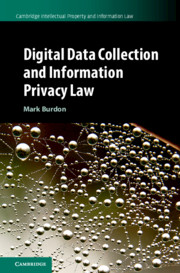Book contents
- Digital Data Collection and Information Privacy Law
- Cambridge Intellectual Property and Information Law
- Digital Data Collection and Information Privacy Law
- Copyright page
- Dedication
- Contents
- Figure and Tables
- Acknowledgements
- 1 Introduction
- Part I The Collected World
- Part II Information Privacy Law’s Concepts and Application
- Part III Information Privacy Law for a Collected Future
- 7 Collected Challenges
- 8 Conceptualising the Collected
- 9 Using Information Privacy Law to Interrupt Modulation
- 10 A Smart, Collected or Modulated World?
- Bibliography
- Index
- Cambridge Intellectual Property and Information Law
8 - Conceptualising the Collected
from Part III - Information Privacy Law for a Collected Future
Published online by Cambridge University Press: 04 April 2020
- Digital Data Collection and Information Privacy Law
- Cambridge Intellectual Property and Information Law
- Digital Data Collection and Information Privacy Law
- Copyright page
- Dedication
- Contents
- Figure and Tables
- Acknowledgements
- 1 Introduction
- Part I The Collected World
- Part II Information Privacy Law’s Concepts and Application
- Part III Information Privacy Law for a Collected Future
- 7 Collected Challenges
- 8 Conceptualising the Collected
- 9 Using Information Privacy Law to Interrupt Modulation
- 10 A Smart, Collected or Modulated World?
- Bibliography
- Index
- Cambridge Intellectual Property and Information Law
Summary
Chapter 8 investigates the protection of information privacy in a collected world. A critique of the control model is undertaken in relation to five intended outcomes of information privacy law: enhancement of individual autonomy through non-interference protections at the point of data collection; power vacuums that preserve spaces for autonomous decision-making; information privacy law’s mode of transactional operation; the use of privacy policies, as information disclosure mechanisms; and in-built balancing mechanisms, which seeks to ensure fair outcomes for individuals and data collectors. Julie Cohen’s work is then examined as a means of further critiquing the control model and reshaping a conceptual focus of information privacy based on a more explicit power-related role. The new focus shifts what information privacy seeks to do, and challenges the fundamental precepts of the control model and what information privacy currently seeks to protect. The five intended outcomes thus change markedly. At the heart of this reformulated movement is Cohen’s work on modulation, which better describes the consequences and challenges that arise from the collected world.
Keywords
- Type
- Chapter
- Information
- Digital Data Collection and Information Privacy Law , pp. 216 - 256Publisher: Cambridge University PressPrint publication year: 2020

